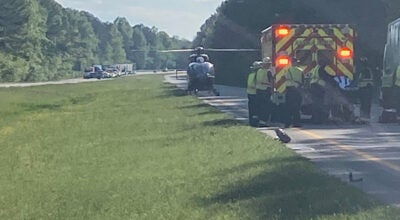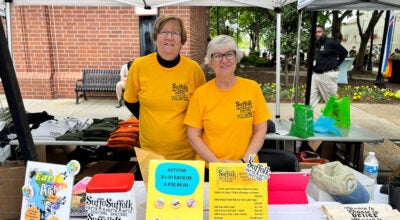Oyster poacher pinched
Published 9:33 pm Thursday, May 28, 2015
A Suffolk man entered an Alford plea to charges he illegally harvested oysters from condemned waters in Bennett’s Creek while operating a vessel with no approved system to treat sewerage.
James Keeling originally faced seven charges stemming from a Virginia Marine Police investigation, but a plea agreement with the commonwealth and amended indictment whittled them down to three misdemeanors.
In Suffolk Circuit Court on Thursday, Keeling pleaded guilty to operating a boat with no onboard sewerage disposal, taking oysters from waters off-limits to shellfish harvesting and taking oysters out of season.
For each conviction, Judge Robert H. Sandwich Jr. slapped Keeling with 90-day sentences in Western Tidewater Regional Jail — suspending them on the condition he avoids brushes with the law for the next two years — and fined him $50. He was also ordered to pay court costs.
Under the plea agreement, the commonwealth agreed to drop charges of forging a public record and uttering a forged public record — felonies carrying prison terms of up to 10 years each.
The defense and the prosecution disagreed over the facts of the complicated case.
Assistant Commonwealth’s Attorney Susan H. Walton said that on the morning of the offense in mid-2014, a marine police officer on patrol discovered Keeling had strayed out of the area he has a state permit to take oysters from.
The officer observed Keeling had equipment on his boat that he was not authorized to use, she said, “because he didn’t have a permit for that particular boat.”
Walton said the officer observed Keeling use equipment on the boat to extract oysters from two locations outside his permitted area.
“He was 54 feet from that line the first time … then 85 feet the second time,” she said, adding that Keeling’s legal harvesting grounds are clearly marked on maps he was provided with by authorities.
Keeling’s attorney, Joshua Pretlow Jr., said the marine police officer was not patrolling the area but had been called there by Keeling, because he was transporting oysters from grounds he rents to another area outside the condemned zone.
Oysters from condemned waters can still be harvested and sold for public consumption if they are moved to a clean area to purge for 15 days.
Pretlow said the officer first ticketed his client for not having the proper permit for the boat he was using. Keeling’s other boat does have the appropriate permit, he added.
“From that it escalated, because of the defendant’s actions and officer’s actions in responding to it,” the attorney said.
And while Walton said Keeling was illegally harvesting in public grounds, Pretlow said he was in unassigned grounds. The Virginia Marine Resources Commission defines unassigned ground as “all grounds other than public ground …and which have not been set aside or assigned by lease, permit, or easement.”
“The regulations are so complicated that it took me hours and hours to sit down and try to find the regulations,” Pretlow said. “They are put in place with no public hearings.”
Sandwich agreed Virginia’s regulations governing shellfish harvesting are complicated. In fact, he described them as a “myriad of mess.”
The Alford plea Keeling entered does not admit guilt but acknowledges there is enough evidence to convict him.
Outside the courtroom after the hearing, asked if he cared to comment on the outcome, Keeling replied, “No,” before adding, “I ain’t done nothing, buddy.”
Walton said Keeling was indicted after “a lot of research and discussion … between the Commonwealth’s Attorney’s Office and the marine police department.”
“To us, there was no question that he had done something illegal,” she said.
VMRC spokeswoman Laurie Naismith confirmed that at the time of the offense, Keeling, who holds state licenses for numerous waterman activities, was on probation for two years.
On Sept. 30, 2013, he was charged with harvesting oysters between sunset and sunrise, and operating a vessel with no on-deck shading for the oysters, Naismith said.
Keeling’s probation was set to expire on Feb. 25, 2016, but now his licenses will likely be revoked when he is called before the commission again after it is formally notified of Thursday’s convictions, according to Naismith.
“I can never say what the commission is going to do,” she said. “Typically, we take oyster charges real seriously, and I think when he comes back before the commission it will be interesting.”
The commission uses its authority to the fullest extent to ensure those breaking the laws and regulations pay the consequences, Naismith said, adding, “There are too many people out there working hard (and) doing the right thing.”






